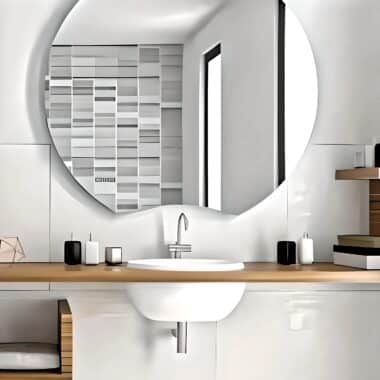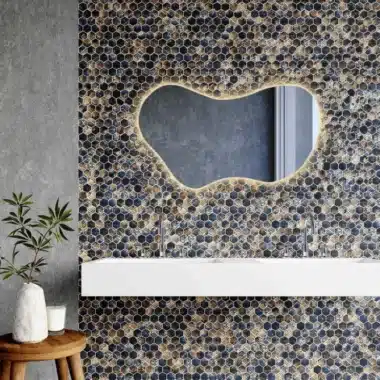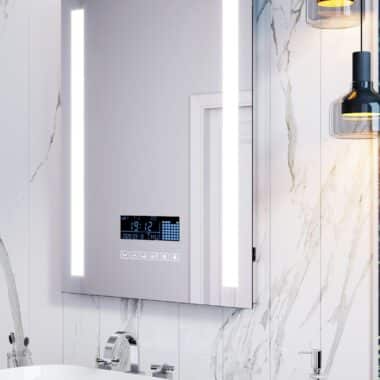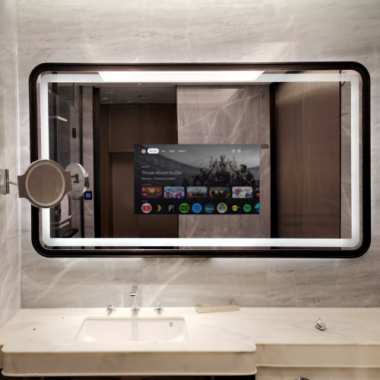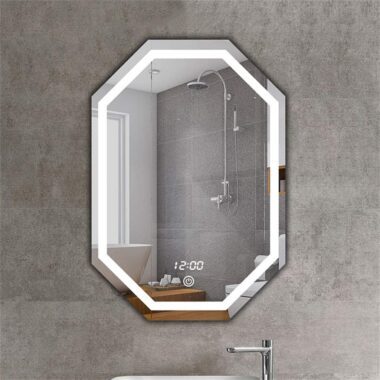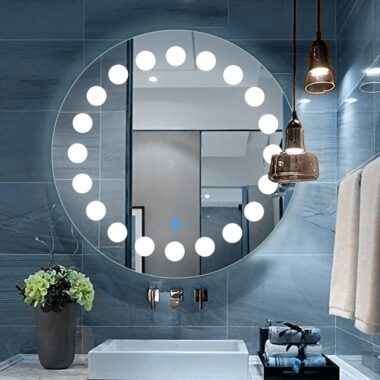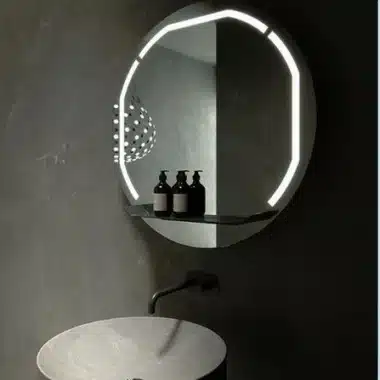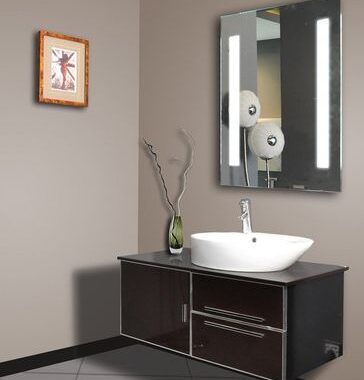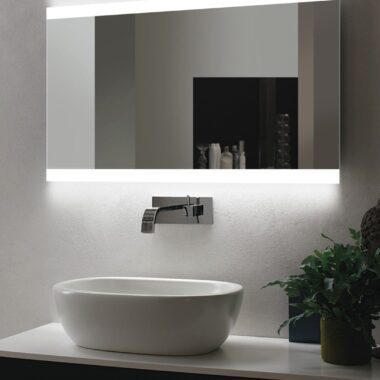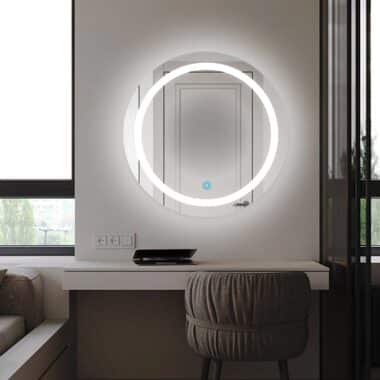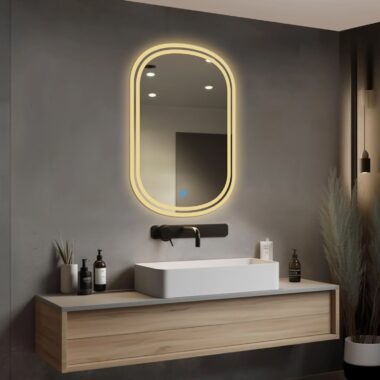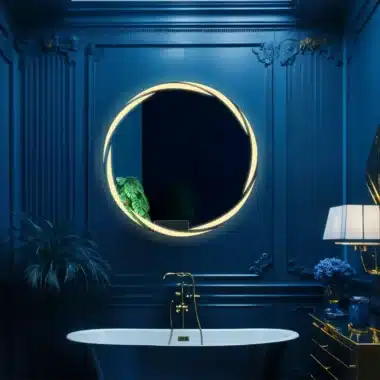Introduction
When upgrading your bathroom with a sleek, modern LED mirror, one of the most important questions to answer is whether to wire the mirror yourself or hire a professional electrician. While the allure of a DIY project can be tempting—especially if you’re keen on saving money—wiring an LED mirror involves working with electrical components, which can be risky if not done correctly. On the other hand, hiring an electrician guarantees safety and efficiency but comes at an additional cost.
In this article, we’ll explore the pros and cons of wiring an LED mirror yourself versus hiring a professional electrician, helping you make the best decision for your bathroom upgrade.
Understanding the Wiring Requirements of an LED Mirror
Before deciding whether to tackle the installation of your LED mirror yourself, it’s essential to understand the basic wiring requirements. Most LED mirrors are designed with either a plug-and-play system or a hardwired connection.
Plug-and-Play LED Mirrors: These mirrors are simpler to install and can be plugged directly into a standard electrical outlet. They usually come with a cord and a plug, meaning you don’t have to deal with any electrical work beyond positioning the mirror and plugging it in.
Hardwired LED Mirrors: These require a direct connection to your home’s electrical system. This typically involves connecting the mirror’s wiring to the existing wiring behind the bathroom wall, which can be more complicated.
For hardwired installations, the wiring setup often involves connecting the live, neutral, and ground wires, which may require a junction box or an existing power outlet behind the wall.
Option 1: DIY LED Mirror Wiring
Pros of DIY Wiring:
Cost Savings: The most obvious advantage of going the DIY route is saving money. Hiring an electrician can cost anywhere from $100 to $300 per hour, while wiring the mirror yourself only requires the purchase of necessary tools and materials.
Satisfaction: Completing a successful DIY project can be incredibly rewarding. If you’re handy and enjoy working on home improvement projects, wiring your LED mirror can be a fulfilling task.
Time-Saving (If You’re Experienced): If you already have experience with electrical work, wiring an LED mirror yourself could be faster than scheduling an electrician and waiting for an appointment.
Cons of DIY Wiring:
Safety Risks: Working with electricity is inherently dangerous. If you’re unfamiliar with electrical wiring or do not follow proper safety protocols, you could risk electrocution or cause a fire hazard.
Potential Mistakes: Incorrect wiring can lead to mirror malfunctions, damage to the electrical system, or worse, create a safety hazard. An improperly wired mirror may also void the manufacturer’s warranty.
Time and Effort (If You’re Inexperienced): For beginners, wiring a mirror can be time-consuming and complex. You’ll need to factor in the learning curve, gathering tools, and troubleshooting potential issues along the way.
Building Codes and Permits: Depending on your location, DIY electrical work may not meet local building codes, and it may even require a permit. In some places, failing to obtain a permit could lead to fines or difficulties when selling the house.
Option 2: Hiring an Electrician
Pros of Hiring an Electrician:
Expertise and Safety: Electricians are trained professionals who understand the complexities of electrical systems and adhere to safety regulations. They’ll ensure that the wiring is done correctly and safely, reducing the risk of electrical malfunctions, fire hazards, or electrocution.
Guaranteed Results: An electrician can quickly identify potential issues and provide solutions that you might miss as a DIYer. They have the experience and knowledge to ensure the job is done right the first time.
Saves Time: If you hire an electrician, you won’t need to spend time researching how to wire the mirror, gathering tools, or troubleshooting. They will take care of everything efficiently.
Compliance with Local Codes: Hiring a professional ensures that the installation complies with local electrical codes. If your city requires a permit for electrical work, an electrician will handle that process for you.
Cons of Hiring an Electrician:
Higher Cost: Hiring a professional electrician typically costs more than doing it yourself. Depending on the complexity of the wiring and local labor rates, an electrician can charge anywhere from $100 to $300 per hour for installation. If the wiring requires additional materials or customization, the price may go even higher.
Scheduling Delays: If you’re in a rush, scheduling an appointment with an electrician can delay the project, especially if they have a busy schedule. In contrast, you can start a DIY project at your convenience.
Less Involvement: If you enjoy working on home improvement projects, hiring a professional means you’ll miss out on the hands-on experience of installing your mirror.
How to Know If You Should DIY or Hire an Electrician
Here are some questions to ask yourself to determine whether you should take the DIY route or hire an electrician:
Do I Have Experience with Electrical Work?
If you have experience wiring outlets, light fixtures, or working with electrical systems in the past, you might feel confident enough to tackle the LED mirror installation. However, if you don’t have experience or don’t feel comfortable working with electricity, it’s safer to hire a professional.
Am I Prepared to Follow Safety Protocols?
Electrical work requires strict adherence to safety protocols. If you’re unsure how to safely handle electricity or don’t have the necessary tools, it’s best to leave the job to a licensed electrician.
Is the Wiring Installation Complicated?
If your LED mirror requires hardwiring into your home’s electrical system (rather than simply plugging it in), it’s a good idea to consult an electrician. Hardwiring typically involves working with live wires, which is more complex and requires specialized knowledge.
Do I Have the Necessary Tools and Equipment?
If you don’t have the proper tools, such as a power drill, wire stripper, or electrical tape, and don’t want to invest in them, it might be better to hire an electrician. On the other hand, if you already have the right tools and enjoy DIY projects, you may find it worth doing the work yourself.
Conclusion
Wiring an LED bathroom mirror can be an excellent DIY project if you’re comfortable working with electricity and have experience with basic electrical installations. The cost savings and sense of accomplishment can be a great motivator. However, if you’re unfamiliar with electrical work or prefer to play it safe, hiring a professional electrician ensures a properly wired, safe, and efficient installation. Always prioritize safety, and if in doubt, don’t hesitate to consult a licensed electrician.
Ultimately, the decision comes down to your skill level, comfort with electrical work, and the complexity of the installation. Whether you choose to DIY or hire an expert, your LED mirror will certainly elevate the aesthetic and functionality of your bathroom.
Custom Message:
Write 100% Human Content that Ranks Higher: https://bypassgpt.ai/?ref=mts
Book a Consultation with me or hire me on Fiverr https://bit.ly/4bgdMGc


